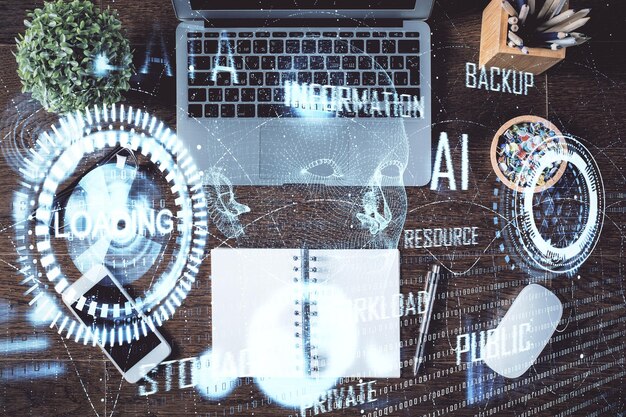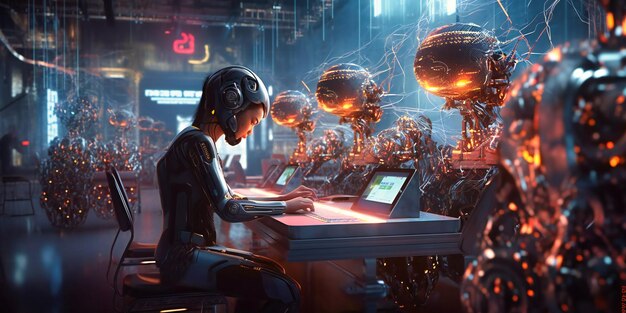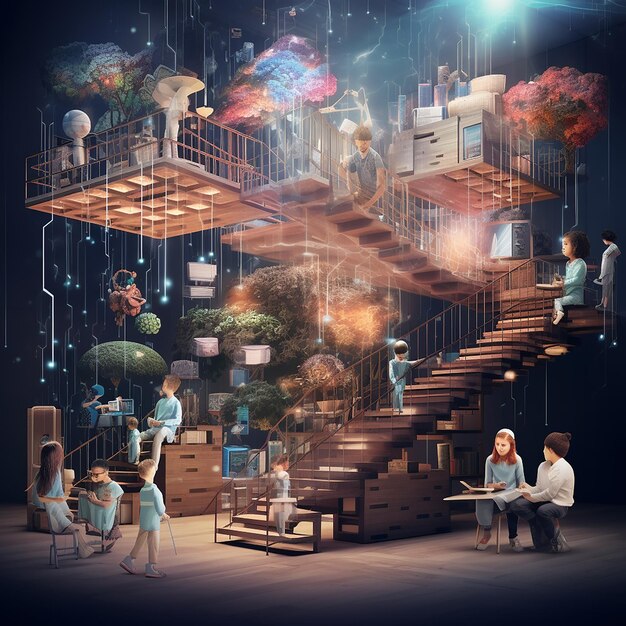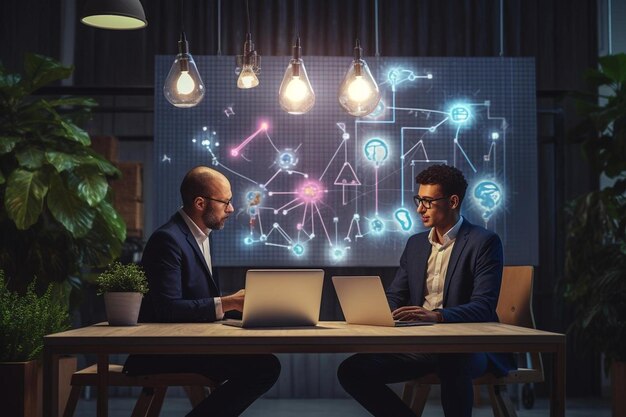Quick Read
OpenAI’s GPT Store: Copyright Concerns and the Future of AI-Generated Content
OpenAI, a leading research organization in artificial intelligence (AI), recently unveiled its GPT Store, a platform where businesses can purchase custom-made AI text generators. This development marks an exciting leap forward in the potential applications of AI in various industries, but it also raises crucial copyright concerns that need to be addressed.
The Exciting Potential of OpenAI’s GPT Store
Openai’s GPT Store allows businesses to purchase text generators tailored to their specific needs, which can be used for a wide range of applications such as content creation, customer service interactions, or even composing code. These AI-generated texts are designed to mimic human writing styles and can produce high-quality, engaging content that is indistinguishable from those created by humans.
Copyright Concerns: Who Owns the Content?
The launch of OpenAI’s GPT Store brings about a significant question regarding copyright ownership: Who owns the intellectual property rights to these AI-generated texts? While OpenAI retains the rights to the underlying technology used in generating these texts, it remains unclear whether they can claim copyright ownership over the output itself.
Legal Precedents and AI-Generated Content
There have been a few legal precedents in recent years regarding ai-generated content and copyright law. In 2018, the US Copyright Office denied a registration request for an ai-generated book due to it lacking human authorship. However, this ruling focused on the creative process itself rather than the resulting content. In another case, a copyright infringement lawsuit was filed against a company for using AI to generate music that sounded too similar to a preexisting work.
Potential Solutions and Future Implications
To address these copyright concerns, several potential solutions have been proposed. One approach is to establish a new category of intellectual property rights specifically for AI-generated content or to recognize a joint copyright between the creators and developers of such technologies. Another solution is to adopt a licensing model, where businesses pay for access to the AI text generator but do not gain ownership of the content it produces.
Impact on Industries and Creativity
The implications of these copyright concerns extend beyond the legal realm, affecting various industries and artists. For instance, publishers might need to reconsider their business models if they can no longer claim exclusive rights over AI-generated content. Moreover, the use of AI-generated text may change the dynamics of creative industries like music, art, and literature, leading to new collaborations and partnerships between human artists and AI technologies.
Conclusion
In conclusion, OpenAI’s GPT Store represents a groundbreaking development in AI applications and content creation. However, the copyright concerns surrounding this technology need to be addressed through legal frameworks or industry solutions to ensure fair compensation for creators and developers while encouraging innovation and growth in this field. As AI-generated content continues to evolve, it is essential that we navigate these complex issues thoughtfully and collaboratively.

The Power of OpenAI’s GPT: Revolutionizing AI-Generated Content
Introduction
: OpenAI, a leading organization in artificial intelligence (AI) research and development, has been making significant strides in the field since its inception.
Founded in 2015 by Elon Musk and Sam Altman
, OpenAI’s mission is to create artificial general intelligence (AGI) in a way that benefits humanity as a whole.
One of their most notable achievements is the development of the
GPT (Generative Pretrained Transformer)
technology. This state-of-the-art system utilizes
massive datasets and deep learning techniques to generate human-like text responses
.
Background on OpenAI’s Mission and Achievements
: OpenAI began its journey with a commitment to open-source research, aiming to advance AI technology in a responsible and ethical manner. They have created various models, including DALL-E, CLIP, and Jukebox, which have garnered widespread attention for their innovative capabilities.
Overview of the Capabilities and Applications of GPT
: With its advanced language understanding, GPT can perform a myriad of tasks, from answering queries to composing poetry or writing code. It has been utilized in numerous applications, such as
content creation for websites and social media platforms
,
customer service interactions
, or even generating
creative writing, stories, and summaries
.
Introduction to the Concept of AI-Generated Content and its Increasing Significance in Today’s Digital World
: As digital media continues to grow, so does the demand for engaging, high-quality content. AI-generated content, powered by models like GPT, has emerged as a game changer, enabling organizations to meet this demand more efficiently and effectively while offering personalized experiences for their audiences.
OpenAI’s GPT Store: A Game Changer in Content Creation
OpenAI’s GPT Store, an extension of OpenAI’s Generative Pretrained Transformer (GPT) model, is revolutionizing the content creation landscape. This innovative platform offers customizable AI-generated content tailored to various industries and applications.
Types of Content:
GPT Store generates a wide array of content types, including but not limited to: articles, stories, poetry, and even code snippets. Users can request content in multiple languages, catering to diverse needs and requirements.
Pricing and Subscription:
The GPT Store employs a flexible pricing model, with pricing based on the length, complexity, and format of the content requested. Users can choose from different subscription plans to suit their requirements, enabling them to generate a specified number of words or requests within a given time frame.
Content Quality and Use Cases:
The GPT Store’s content quality stands out, often surpassing expectations. Compared to human-generated content, AI-created text offers several advantages: it is consistent, can produce a high volume of content in a short time, and can maintain a specific tone or style. However, it is essential to note that AI-generated content still lacks the depth of understanding, context, and emotional intelligence that human authors bring.
Marketing:
In marketing, GPT Store’s content can be used to create social media posts copies, landing pages, and email campaigns. With its ability to generate engaging, on-brand content, marketers can save time while ensuring a consistent brand voice.
Education:
In education, AI-generated content can serve as a valuable resource for creating educational materials like quizzes, study guides, and practice exercises. While these materials may not replace human teachers entirely, they can significantly enhance the learning experience.
Entertainment:
In entertainment, AI-generated content can be used to write scripts for movies or television shows. This can help writers in the initial stages of story development and character creation, saving them valuable time and resources.
Technology:
In technology, AI-generated code snippets can help developers test and debug applications. While these codes may not be as complex or sophisticated as those written by human coders, they can serve as a useful starting point for developers.
Limitations and Ethical Considerations:
Despite its advantages, the GPT Store’s content has limitations. For instance, it may not be able to understand complex contexts or nuances that human writers can. Ethical considerations around plagiarism and copyright also arise when using AI-generated content in professional settings.

I Copyright Concerns: Ownership and Legal Implications of AI-Generated Content
Overview of copyright law and its relevance to AI-generated content
Copyright law, a fundamental legal framework for the protection of creative works, has gained renewed relevance in the era of Artificial Intelligence (AI) and machine learning. This complex body of law was first established in the 18th century, with its primary objective being to promote the progress of arts and sciences by securing for authors and their successors the exclusive right to reproduce, distribute, and publicly perform their original works.
Discussion on the history, principles, and challenges of copyright law
The evolution of copyright law has seen various amendments and expansions over the centuries, adapting to changing technologies and societal values. The principles underlying copyright law include originality, creativity, and the limited monopoly granted to the author for a specified period of time. However, challenges persist in defining what constitutes an original work, balancing the interests of creators and users, and ensuring that copyright protection does not stifle innovation.
The concept of authorship in relation to AI-generated content
With the rise of AI-generated content, questions around the very nature of authorship have surfaced. In traditional contexts, the concept of an author as a human creator with intent and skill is well-established. However, in the case of AI-generated content, it is less clear who should be considered the author – the human programmer or the machine itself.
Analysis of current legal frameworks and their applicability to AI-generated content
Copyright protection for AI-generated content as a derivative work or as an independent creation
Current copyright law provides some guidance on the protection of AI-generated content. Depending on the specific circumstances, such content could potentially be considered a derivative work – that is, a new work based upon an existing one – or an independent creation. In the former case, copyright protection would extend to the human creator of the derivative work, while in the latter case, ownership and protection would be more ambiguous.
Liability for copyright infringement and potential defenses (e.g., fair use, substantial similarity)
In cases where AI-generated content infringes on copyrighted material, the liability for copyright infringement and potential defenses are critical considerations. For instance, fair use or substantial similarity may provide some protection. However, these defenses can be subjective and complex to apply in practice, particularly when dealing with AI-generated content.
Emerging debates on the need for new regulations or modifications to copyright law in response to AI-generated content
The role of creators, platforms, and users in shaping the future of copyright law
The emergence of AI-generated content has sparked a heated debate on the need for new regulations or modifications to copyright law. Creators, platforms, and users all have a stake in this conversation. Some argue that existing copyright laws are insufficient for addressing the challenges posed by AI-generated content, while others believe that no changes are necessary.
Ethical considerations and potential solutions (e.g., attribution, revenue sharing)
Ethical considerations are also a critical part of the discussion surrounding AI-generated content and copyright law. For instance, questions around attribution and revenue sharing for creators whose work is used as input for AI systems are essential to address. Solutions may include implementing new licensing models or rethinking the very nature of authorship in the context of AI-generated content.

Future Implications:
The Impact of AI-Generated Content on Creativity, Businesses, and Society
Discussion on the implications for content creators and artists in various industries
- Opportunities and challenges for human creators: With the rise of AI-generated content, human creators face both opportunities and challenges. On one hand, they can leverage AI tools to enhance their work, leading to new creative possibilities. On the other hand, they may face increased competition and potential displacement from AI-generated content. For instance, in the field of writing, AI tools can generate articles, reports, or even poetry. However, human creators can add value by providing unique perspectives, emotions, and the ability to understand complex contexts.
- Potential ethical dilemmas and solutions: The use of AI-generated content raises several ethical issues. For example, should AI-generated content be labeled as such? How can we ensure that human creators receive fair compensation for their work when it is used to train or inspire AI systems? These issues require ongoing discussion and collaboration between stakeholders, including content creators, businesses, and policymakers.
Exploration of the business implications for content industries and platforms
- Opportunities for new revenue streams and business models: The rise of AI-generated content presents new opportunities for businesses in the content industry. For example, platforms that offer subscriptions or licensing for access to AI-generated content could generate significant revenue. Additionally, businesses can leverage AI tools to personalize content recommendations and improve user experiences.
- Strategies for human creators to adapt: To remain competitive in the face of increasing AI-generated content, human creators must adapt. They can focus on areas where their unique skills and creativity add value, such as concept development, storytelling, or character design. Additionally, they can collaborate with AI tools to enhance their work and explore new creative possibilities.
Consideration of societal implications, including the impact on employment, education, and cultural values
- Opportunities for new jobs: While AI-generated content may displace some jobs, it also creates new opportunities. For example, content moderation, AI curation, and AI education are emerging fields that require human expertise to ensure the quality and ethics of AI-generated content. Additionally, human creators can provide guidance and feedback to AI systems to improve their performance.
- Ethical considerations: The use of AI-generated content in education, media, and entertainment raises ethical questions. For instance, how do we ensure transparency and consent when using AI to generate content? How can we preserve cultural values and prevent the spread of misinformation? These are important questions that require ongoing debate and discussion.

Conclusion
In this article, we have explored the emergence and implications of AI-generated content. A.I. has already made significant strides in producing creative works, from poetry and music to visual arts and even journalism. With the aid of machine learning algorithms and deep learning neural networks, AI can analyze vast amounts of data and generate content that mirrors human-like creativity.
Key Points:
- AI can generate creative works in various domains, including art, music, literature, and journalism.
- The use of AI-generated content raises complex questions regarding copyright law and the nature of creativity.
- Businesses can benefit from AI-generated content, but there are potential ethical concerns related to transparency and authenticity.
- Society as a whole must grapple with the implications of AI-generated content on our culture, values, and identity.
Looking Ahead:
Reflection: As AI-generated content becomes increasingly sophisticated and prevalent, it is essential that we continue to examine its implications for copyright law, creativity, businesses, and society. Copyright law must adapt to the unique challenges posed by AI-generated content, while creators and businesses must navigate the ethical complexities of using or exploiting such works. Moreover, society as a whole must engage in a thoughtful dialogue about the role of AI-generated content in our culture and the potential impact on human creativity, expression, and identity.
Call to Action:
Call to Action: This article serves as a starting point for further research, collaboration, and dialogue on these important issues. We invite scholars, practitioners, policymakers, and the general public to engage in a thoughtful and open conversation about the future of AI-generated content and its implications for copyright law, creativity, businesses, and society. Let us work together to ensure that AI-generated content is used in a responsible, transparent, and ethical manner, while preserving the value and importance of human creativity and expression.
